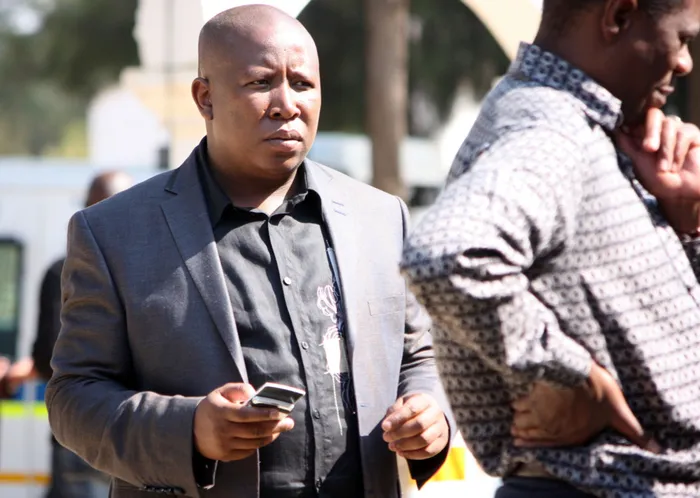DA in race row

Julius Malema, President of the ANCYL at the National Eexecutive Committee (NEC) meeting at Centurion, Johannesburg. Picture: Motshwari Mofokeng Julius Malema, President of the ANCYL at the National Eexecutive Committee (NEC) meeting at Centurion, Johannesburg. Picture: Motshwari Mofokeng
George Matlala
THE DA has appointed an all-white team of executive directors to run its day-to-day affairs at its head office, triggering accusations that it was failing to transform despite using black faces during elections to get votes.
The Sunday Independent has also established that DA chief executive officer Jonathan Moakes is embroiled in allegations of nepotism after his wife, Khurshed, was appointed as an executive director in an administrative team that does not reflect party leader Hellen Zille’s racial inclusion rhetoric.
The appointment of Moakes’s wife and an all-white top administration team are laid bare in an internal memorandum in the possession of The Sunday Independent.
In the two-page document, dated August 11, Moakes notifies the DA bigwigs, including Zille and the federal chairman Wilmot James, among others, of the changes at the national head office.
Moakes and his team of executives are central to the party’s fundraising efforts, communicating the message of the DA in the media and rolling out the campaigns of the party, among others.
It has also emerged that there were concerns about the team of DA directors at provincial level, which is predominantly white.
The staff appointments by Moakes, who is seen as a close ally of Zille, have triggered a debate among party leaders, in a development that appears to have dealt a blow to the party’s transformation agenda.
Moakes appointed former DA communications head Gareth van Onselen as the new executive director for innovation and projects, while Gavin Davis, who is Zille’s former advisor, has been appointed as the new executive director of communications.
Those who remained in their positions include organisational development and operations executives, Penny Tainton and Liana van Wyk, and Liz Geyser, the Chief Financial Officer.
“Each provincial director is requested to forward this memorandum to all formations in their province and ensure that their provincial executive and regional executives have received it,” the document reads.
Moakes confirmed that his wife was appointed to the national office but denied this amounted to nepotism.
He said he did not participate in the process – which included interviews – through which his wife was appointed.
“Anybody is welcome to investigate the process (of the appointment)… I recused myself ,” he said.
“Khurshed has been in the party for longer than me… I don’t think she should be prejudiced by virtue of the fact that she is my wife,” he said.
Analysts said the DA’s failure to appoint black people into its strategic positions was not consistent with its public racial inclusion statements and election messages, which are aimed at not only retaining white support, but also attracting black people.
Moakes said the party was in the process of restructuring and used competence as a criterion to appoint officials. “Overall fitness for purpose is taken into account. The skills, experience and capacity of the relevant candidate to do the job are considered and it is essential that all candidates align with the core values of the DA,” he said.
Asked if the DA did not have any competent black people for top administrative posts, Moakes said: “The need for our staff component to increasingly reflect the diversity of our country is taken into account.”
ANC Youth League president Julius Malema and the ANC have always dismissed the DA as a “racist, white party” that does not have interests of black people at heart.
In the recent polls, the DA relied on Patricia de Lille and Lindiwe Mazibuko’s black faces to show itself off as a multi-racial party.
In her appeals for black support, Zille launched her party manifesto at Klipspruit in Soweto, where the Freedom Charter was adopted in 1955. She visited the Solomon Mahlangu square in Mamelodi, Tshwane, as an example of how her party had embraced the Struggle for freedom – and even claimed Nelson Mandela belonged to all South Africans – not just the ANC.
The concerted, public embrace of black people saw the official opposition making inroads into black areas in the last local elections, winning wards that were historically ANC strongholds.
The DA even won a ward previously led by the ANC in Delareyville, Tswaing, in the North West, where President Jacob Zuma had pleaded with the community a few days before the elections to vote for the ANC. Municipal poll success came after Zille used the party’s victory in by-elections in Gugulethu and Grabouw in the Western Cape last year to argue that the DA was not a white party.
But professor Lesiba Teffo, the new head of the Institute for African Renaissance Studies at the University of SA, said the perception that the DA was a white party was going to haunt it in the future.
“The perception that the DA is a white middle-class party is an albatross around their neck and for as long as, in their appointments, politically and administratively, they are not seen to be addressing that issue (of transformation), it might come back to haunt them,” he said.
Political commentator Sipho Seepe said Zille’s appointment of staff showed the party was using black people for public relations while doubting their ability to deliver. “The DA is displaying elements of hypocrisy and double standards. It is easy to preach that (transformation) but not easy to do,” he said. “This is the general portrait of white liberalism. Black people are used for public relations,” he added.
Moakes is also the strategist of the party credited with keeping the DA’s grip on power in the Western Cape while penetrating ANC strongholds.